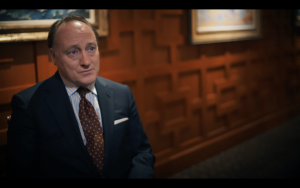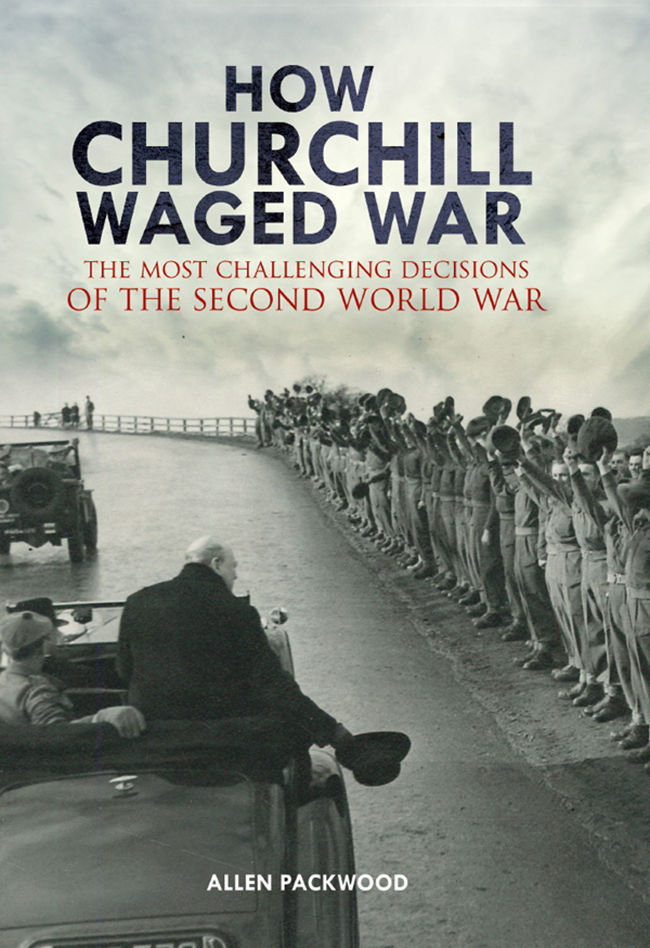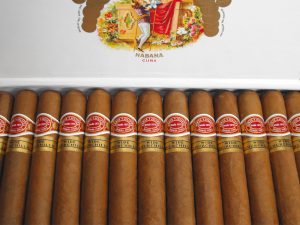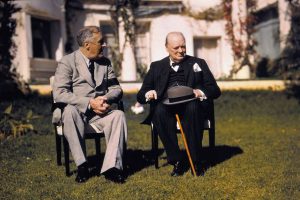
Bulletin #127 – Jan 2019
Winston as Warlord

January 6, 2019
Allen Packwood, How Churchill Waged War, Frontline, 2018, 260 pages, £25/$34.95. ISBN 978–1473893894
Review by David Freeman
Reflecting on his reputation after the war, Churchill noted: “People say my speeches after Dunkirk were the thing. That was only a part, not the chief part. They forget that I made all the main military decisions.” Indeed, Churchill did not just lead by inspiration; he waged war—exactly what he said he would do in his first speech to Parliament as Prime Minister. How Churchill went about it is the subject of this gripping new study by Allen Packwood.
For many years Packwood has served as Director of the Churchill Archives Centre at Cambridge. His deep familiarity with the papers of Winston Churchill has resulted in this his first (and hopefully far from last) book. Every page illustrates his extensive knowledge of the primary documents for this book uses citations at the bottom of each page and not endnotes following the chapters or buried in the back. A quick glance down shows that Packwood is supporting his arguments with original archival documents. Even his secondary sources are mostly the published versions of primary materials such as diaries, letters, and memoirs.
Please help support the International Churchill Society by purchasing your copy at Amazon.com today.

2025 International Churchill Conference
Armed with this formidable knowledge, Packwood does not attempt to provide a comprehensive account of Churchill as warlord. Instead he has chosen ten subject areas that interested him in particular as he set out “to try and answer the question what did Churchill do? How did he wage war?” Each chapter is a thoughtful but fast-paced and self-contained study. The choice of topics provides a good chronological spread of the war years starting in 1940 with Churchill’s decision as Prime Minister to serve also as Minister of Defence, through the decision in 1943 to demand the unconditional surrender of the Axis nations [see related story], and concluding with his determination to run an aggressive campaign in the general election of 1945.
By 1942 Churchill was being heavily criticized for the British Army’s conspicuous lack of success on the battlefield during the first three years of the war. Churchill called this the most anxious period of the war for him: he knew that with the USSR and USA now in the conflict victory was inevitable, but it would still take some time for the Allied war machine to energize fully. Conservative and Labour MPs alike were saying that the trouble stemmed from the Prime Minister overburdening himself by taking on the Defence portfolio.
Churchill knew full well, as many MPs preferred to forget, that initial British success was lacking due to the “locust years” before the war when the major parties largely neglected Churchill’s calls for rearmament. He also had learned the bitter lesson of the ill-fated 1915 Dardanelles campaign that coordination of the armed forces needed to start at the very top. One of Packwood’s many strengths is to show how in the midst of managing military operations Churchill also deftly handled the tactical business of politics.
Like Lincoln in the American Civil War, Churchill presided over a Cabinet that included a team of rivals. Initially these included his immediate predecessor and still the Conservative Party Leader Neville Chamberlain as well as Foreign Secretary Lord Halifax pushing a proposal for peace talks with Hitler. Later Churchill had to deal with the austere Sir Stafford Cripps and the mercurial Lord Beaverbrook giving every sign of positioning themselves to succeed as Prime Minister should Churchill falter. By establishing himself as Minister of Defence, however, Churchill not only guaranteed a united effort by the fighting services he strengthened his political hand. As Packwood observes, Churchill had reporting to him both the military and civil wings of the War Cabinet Secretariat. This combined with the Downing Street private office created “a much larger ‘handling machine’; one that was infinitely better geared to meeting the vastly increased business coming across the Prime Minister’s desk in wartime.”
One of the most pleasant aspects of reading this book is coming upon little-known material culled from the archives to illustrate well-known episodes in a fresh way. The dour Air Chief Marshal Dowding, for example, after the fall of France and on the eve of the Battle of Britain when his Fighter Command would face its greatest test sent Churchill a note to say, “Well! Now it is England against Germany, and I don’t envy them their job!” The following year when the publication of the idealistic points of the Atlantic Charter stirred up nationalist expectations in India, the Secretary of State Leo Amery—never afraid to criticize Churchill to his face—put his finger on the true significance of the first wartime meeting between the Prime Minister and FDR: “We shall no doubt pay dearly in the end for all this fluffy flapdoodle. But if meanwhile under cover of it our two democratic dictators have really got down to business, we must be content to accept it as the price of victory.”
The Amery papers along with those of many other Churchill contemporaries such as Clement Attlee are housed at the Churchill Archives under Packwood’s superb leadership. After one reading, my copy of How Churchill Waged War is already heavily underlined and annotated. We must hope for more such books from Packwood displaying his mastery of the facts.
To watch a video of Allen Packwood speaking about his book to the 35th International Churchill Conference last November, please CLICK HERE.
David Freeman is the editor of the Churchill Bulletin.
Subscribe
WANT MORE?
Get the Churchill Bulletin delivered to your inbox once a month.





